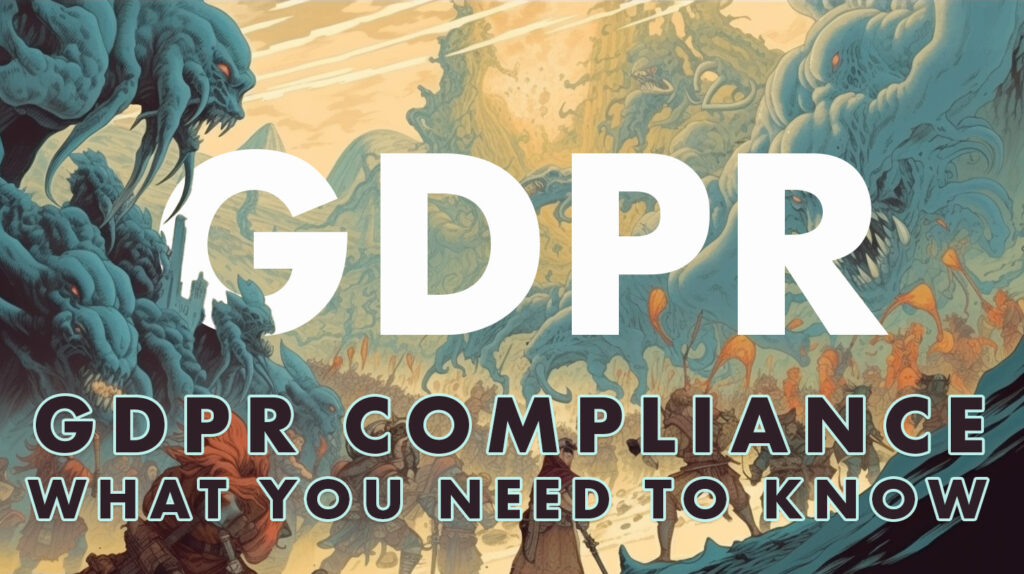GDPR Made Easy
In today’s digital age, data privacy has become a growing concern for individuals and organizations alike. As more and more businesses collect and store personal information about their customers, it has become imperative to regulate how this data is used and protected. This is where GDPR, the General Data Protection Regulation, comes into play.
Officially in force as of May 25, 2018, GDPR is arguably the most critical privacy change in the last two decades and the most important data privacy regulation for everyone within the EU. Its aim is to protect the privacy rights of EU citizens and harmonize data protection laws across the EU.
GDPR compliance is not just a legal requirement but also a way to build trust with customers, avoid hefty fines, and gain a competitive edge. In this article, we will explore the key principles of GDPR, discuss how small businesses can implement GDPR rules on their website, and highlight the benefits and challenges of GDPR compliance.

Understanding GDPR
GDPR is a comprehensive regulation that outlines the rules for processing and protecting personal data of EU citizens. It was created to replace the outdated Data Protection Directive and provide a more consistent framework for data protection across the EU.
Some of the key principles of GDPR include:
- Lawful, fair, and transparent processing: Data processing must be done in a legal, fair, and transparent manner, with clear consent from the data subject.
- Purpose limitation: Personal data must be collected for specific, explicit, and legitimate purposes, and not further processed in a way that is incompatible with those purposes.
- Data minimization: Personal data collected must be adequate, relevant, and limited to what is necessary for the purposes for which they are processed.
- Accuracy: Personal data must be accurate and kept up to date.
- Storage limitation: Personal data should not be kept for longer than is necessary.
- Integrity and confidentiality: Personal data must be processed in a manner that ensures appropriate security, including protection against unauthorized or unlawful processing and against accidental loss, destruction, or damage.
- Accountability: Controllers are responsible for ensuring compliance with GDPR and must be able to demonstrate their compliance.
GDPR applies to any organization that processes the personal data of EU citizens, regardless of whether the organization is located within the EU or not. This means that even small businesses outside of the EU that have customers or website visitors in the EU are subject to GDPR rules.
Implementing GDPR rules for small business websites
Implementing GDPR rules on a small business website can seem daunting, but it is a necessary step to protect customer data and ensure compliance. Here are some key steps that small businesses can take to implement GDPR rules on their website:
- Conduct a data audit: Identify the personal data you collect, process, and store on your website. Determine why you collect the data and whether you really need it.
- Obtain user consent: Make sure you obtain clear and affirmative consent from users before collecting or processing their personal data. Consent must be freely given, specific, informed, and unambiguous.
- Provide a transparent privacy policy: Create a privacy policy that outlines how you collect, use, and process personal data. Make sure the policy is easily accessible and understandable.
- Keep data secure: Take appropriate measures to ensure the security of personal data, including encryption, access controls, and regular security assessments.
- Appoint a Data Protection Officer (DPO): Appoint a DPO if your business processes large amounts of personal data, or if the processing is a core part of your business. A DPO is responsible for ensuring GDPR compliance and acts as a point of contact for data subjects and supervisory authorities.
- Respond to data breaches: Have a plan in place to respond to data breaches, including notifying data subjects and supervisory authorities within 72 hours of becoming aware of the breach.
By following these steps, small businesses can demonstrate their commitment to data privacy and gain the trust of customers. It’s important to remember that GDPR compliance is an ongoing process, and small businesses must regularly review and update their privacy practices to ensure compliance.
Benefits of GDPR compliance
GDPR compliance is not just a legal requirement, but it can also provide several benefits for small businesses. Here are some of the benefits of GDPR compliance:
- Improved customer trust: By implementing GDPR rules on their website, small businesses can demonstrate their commitment to protecting customer data and building trust with their customers.
- Competitive advantage: GDPR compliance can give small businesses a competitive edge by differentiating them from non-compliant competitors.
- Avoidance of hefty fines: Non-compliance with GDPR can result in significant fines, which can have a significant impact on small businesses. By complying with GDPR, small businesses can avoid these fines and associated legal costs.
- Enhanced data security: Implementing GDPR rules can help small businesses enhance their data security practices, including encryption and access controls.
- Better data management: GDPR compliance can help small businesses streamline their data management practices, including data collection, processing, and storage.
- Improved cross-border business: GDPR compliance can help small businesses expand their customer base to other EU countries and facilitate cross-border business.
In conclusion, GDPR compliance can provide significant benefits for small businesses, including improved customer trust, enhanced data security, and competitive advantage. By implementing GDPR rules on their website, small businesses can not only meet legal requirements but also gain a strategic advantage.
Challenges of GDPR compliance
While GDPR compliance can bring significant benefits for small businesses, it also poses some challenges. Here are some of the challenges of GDPR compliance:
- Complexity: GDPR is a complex regulation, and small businesses may struggle to understand and implement all the requirements.
- Resource constraints: Small businesses may lack the resources, such as budget, staff, and expertise, to comply with GDPR.
- Third-party compliance: Small businesses may also need to ensure that third-party service providers, such as hosting providers and payment processors, are GDPR compliant.
- Global impact: Even small businesses outside of the EU that have customers or website visitors in the EU are subject to GDPR rules. This means that small businesses need to comply with GDPR regardless of their location.
- Time-consuming: Implementing GDPR rules can be a time-consuming process, including conducting a data audit, updating privacy policies, and training staff.
- Business disruption: GDPR compliance may require small businesses to make significant changes to their data processing practices, which can disrupt their business operations.
In conclusion, GDPR compliance can pose some challenges for small businesses, including complexity, resource constraints, third-party compliance, global impact, time consumption, and business disruption. However, by proactively addressing these challenges, small businesses can ensure GDPR compliance and gain the associated benefits.
Bonus Section: Tips, Tools, and Best Practices for Making Your WordPress Website GDPR Compliant
If your small business website is built on WordPress, there are several tips, tools, and best practices that can help you make your site GDPR compliant. Here are some of them:
- Use GDPR-compliant plugins: WordPress offers several plugins that can help you make your site GDPR compliant, such as GDPR Cookie Consent, WP GDPR Compliance, and GDPR Framework.
- Implement cookie consent: Make sure your website obtains clear and affirmative consent from users before placing cookies on their devices. Use a cookie consent plugin to display a cookie banner or popup.
- Add a privacy policy: Create a privacy policy that outlines how you collect, use, and process personal data. Make sure the policy is easily accessible and understandable.
- Secure user data: Implement security measures such as SSL encryption, two-factor authentication, and regular security assessments to protect user data.
- Use data protection tools: WordPress offers several data protection tools, such as user role management, data export, and data erasure, that can help you comply with GDPR rules.
- Train your staff: Train your staff on GDPR compliance, including data protection, consent, and breach notification.
- Keep records of processing activities: Maintain records of all processing activities, including data collection, processing, and storage, to demonstrate GDPR compliance.
By following these tips, tools, and best practices, small businesses can ensure GDPR compliance on their WordPress websites. It’s important to note that GDPR compliance is an ongoing process, and small businesses must regularly review and update their privacy practices to ensure compliance.
The GDPR Effect: Why Small Businesses Must Take Data Privacy Seriously
In conclusion, GDPR compliance is a must for small businesses operating within the EU or having customers or website visitors from the EU. It not only helps small businesses comply with the legal requirements but also provides several benefits, such as improved customer trust, enhanced data security, and a competitive advantage. However, GDPR compliance also poses several challenges, including complexity, resource constraints, and time consumption. By proactively addressing these challenges and following best practices, small businesses can ensure GDPR compliance and gain the associated benefits. For WordPress websites, using GDPR-compliant plugins, implementing cookie consent, adding a privacy policy, securing user data, using data protection tools, training staff, and keeping records of processing activities can help ensure GDPR compliance. Overall, GDPR compliance should be seen as a strategic priority for small businesses that value data protection, customer trust, and a competitive edge.



